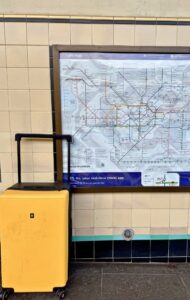Editor’s note: This is a recurring post, regularly updated with new information and offers.
Thanks to its plethora of premium travel perks, the [applyLink pid=”221211836″ overridetext=”Chase Sapphire Reserve®”] (see [termsConditions pid=”221211836″ overridetext=”rates and fees”]) is well-known in the travel credit card space. The [applyLink pid=”22125056″ overridetext=”Chase Sapphire Preferred® Card”] (see [termsConditions pid=”22125056″ overridetext=”rates and fees”]) is the Sapphire Reserve’s mid-tier sibling. The two cards come with annual fees of $795 and $95, respectively.
No matter which Sapphire card you have, Chase clearly defines what counts as travel. However, Chase recently refreshed the Sapphire Reserve, changing how it rewards spending on travel. (The Sapphire Preferred has not undergone any changes.)
So, we’ve updated this guide to clarify which purchases count (and don’t count) toward earning bonus points on both cards.
How many points does the Chase Sapphire Reserve earn on travel?
Existing cardholders
If you applied for your [applyLink pid=”221211836″ overridetext=”Sapphire Reserve”] before June 23, you’ll earn at the following rates until Oct. 25:
- 10 points per dollar spent on hotels and car rentals booked through Chase Travel℠
- 5 points per dollar on Lyft rides (through Sept. 30, 2027) and flights booked through Chase Travel
- 3 points per dollar on all other travel purchases
From Oct. 26, your earning structure will change to the one below.
New cardholders
Those who applied for their card from June 23 — as well as existing cardholders from Oct. 26 — enjoy the following earning rates:
- 8 points per dollar on purchases made through Chase Travel
- 5 points per dollar on Lyft rides (through Sept. 30, 2027)
- 4 points per dollar on flights and hotels booked directly
- 1 point per dollar on all other travel purchases

How many points does the Chase Sapphire Preferred earn on travel?
The [applyLink pid=”22125056″ overridetext=”Chase Sapphire Preferred Card”] earns:
- 5 points per dollar on all travel booked through Chase Travel
- 5 points per dollar spent on Lyft rides (through Sept. 30, 2027)
- 2 points per dollar on all other travel purchases
‘Travel,’ according to Chase
The Chase Travel portal allows you to book various types of travel. Here’s how Chase defines “all other travel purchases:”
“Merchants in this category include airlines, hotels, motels, timeshares, car rental agencies, cruise lines, travel agencies, discount travel sites, campgrounds and operators of passenger trains, buses, taxis, limousines, ferries, toll bridges and highways, and parking lots and garages.”
Compared to bonus categories from other credit cards, Chase’s travel category is extremely generous. (Remember that flights and hotels booked directly with the Sapphire Reserve earn at elevated rates.)
While cards such as the [applyLink pid=”6344″ overridetext=”American Express® Gold Card”] and [applyLink pid=”22504813″ overridetext=”The Platinum Card® from American Express”] offer bonus points for airfare purchases made directly with the airline (with a spending cap of $500,000 on the Amex Platinum per calendar year, then 1 point per dollar), the Sapphire Preferred and Sapphire Reserve cards let you earn a bonus on virtually every trip-related charge.

The travel category encompasses a wide variety of purchases, from cruises to tolls and taxis to parking fees. Airbnb and Uber purchases also count as travel.
The following purchases do not apply toward the Sapphire Preferred’s general travel bonus category, but most shouldn’t come as a surprise:
“Some merchants that provide transportation and travel-related services are not included in this category; for example, real estate agents, educational merchants arranging travel, in-flight goods and services, on-board cruise line goods and services, sightseeing activities, excursions, tourist attractions, RV and boat rentals, merchants within hotels and airports, public campgrounds and merchants that rent vehicles for the purpose of hauling. Purchases from gift card merchants or merchants that sell points or miles will not qualify in the travel category.”
Based on TPG staffers’ experiences in the recent past, there are a few notable travel-related charges that have not posted as travel for the purposes of bonus points with Chase. These include an RV rental and some vacation rentals via VRBO and similar services.
Whether a vacation home rental automatically codes as travel depends on whether an individual or a conglomerate operates it. In the latter case, that charge may be coded as “professional services” instead of travel.

If you’re ever unsure whether a given purchase counts as travel, it could be worth making a small charge and checking whether it earns any bonus points on your online Chase account.
If you believe a travel purchase should have earned bonus points but didn’t, you’re not out of options. Start by checking how the transaction was categorized in your Chase online account; this can often clarify whether the merchant was coded correctly as a travel provider. If it wasn’t, or you’re still unsure, you can contact Chase through a secure message or by phone to request a manual review of the charge.
While Chase may not always adjust your points retroactively, reaching out can provide insight into how certain vendors code and help you make more informed decisions for future purchases. It’s a simple step that could yield extra rewards — or at the very least, peace of mind.
What does Chase typically count as travel purchases?
- Airlines (general travel on the Sapphire Preferred; elevated category on the Sapphire Reserve)
- Buses
- Campgrounds
- Car rental agencies (excluding RV and boat rentals)
- Cruise lines
- Discount travel sites
- Ferries
- Hotels (general travel on the Sapphire Preferred; elevated category on the Sapphire Reserve)
- Limousines
- Motels (often categorized as hotels)
- Parking lots and garages
- Passenger trains
- Taxis
- Timeshares
- Toll bridges and highways
- Travel agencies
What does Chase typically not count as travel purchases?
- Educational merchants arranging travel
- Excursions
- Gift card merchants
- Inflight goods and services
- Merchants that sell points or miles
- Merchants that rent vehicles for the purpose of hauling
- Merchants within hotels and airports
- Onboard cruise line goods and services
- Public campgrounds
- Real estate agents
- RV and boat rentals
- Sightseeing activities
- Tourist attractions
Bottom line
The [applyLink pid=”22125056″ overridetext=”Sapphire Preferred”] offers strong value on general travel, while the [applyLink pid=”221211836″ overridetext=”Sapphire Reserve”] provides even more rewards in elevated categories.
According to TPG’s July 2025 valuations, that translates to a 4.1% return on general travel purchases with the Sapphire Preferred. With flight or hotel purchases made directly with the Sapphire Reserve, you could get a return of 8.2%. Then, you can put your points to use with Chase’s airline and hotel partners.
On top of that, these Chase cards have some of the most generous travel insurance and purchase protections on the market. This makes either card a valuable addition to your wallet.
Apply here: [applyLink pid=”221211836″ overridetext=”Chase Sapphire Reserve”]
Apply here: [applyLink pid=”22125056″ overridetext=”Chase Sapphire Preferred Card”]
This post was originally published on this site






